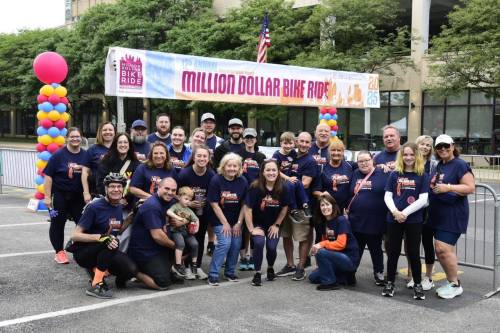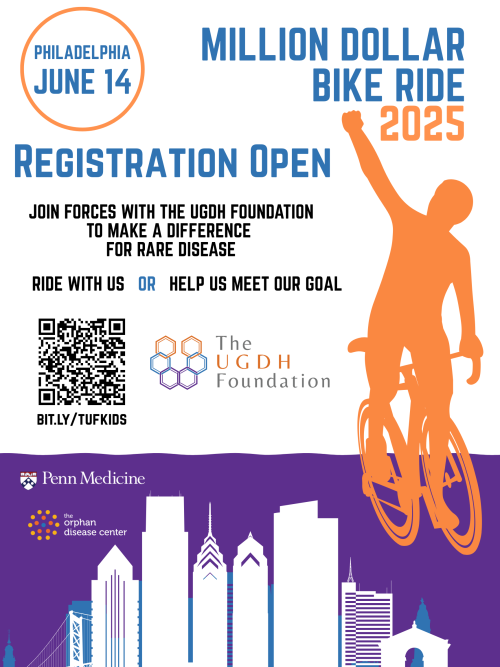
$2,483
Raised of $3,000
Rebekah Hall
Fundraiser Profile
Participating in 2025 Million Dollar Bike Ride
Team Captain of The UGDH Foundation
Love always hopes.
The Short Story
I'm here because I love Thad, and I want the world to be a better place because of him.
We started The UGDH Foundation to unlock better treatments and a cure for everyone living with Jamuar syndrome, the disorder that affects my boy Thad. The Million Dollar Bike Ride is our first major fundraiser.
The Penn Medicine Orphan Disease Center has been running this event for twelve years, raising over $22 million for rare disease research. For the first time ever, because of our involvement this event will now represent families affected by Jamuar syndrome. There are scientific professionals in the world who want to work on solving the problem of UGDH-related disorders. All funds raised for our team can go toward enabling them to do that work!
I have a personal goal of raising $3000. As a team, we want to reach $20,000. Thank you for considering supporting this cause. We are grateful for any donation and every prayer.
The Long Story
Thaddeus Hall was born a hairy little man in 2011. Very cute with his dark mane and fuzzy cheeks. He had a high Apgar score, but for some reason he would clench his fists and furrow his brows and arch his head backward. The neonatologist said perhaps he would grow out of it, but we were getting a referral to neurology.
Neurology knew something was wrong but couldn't tell what. A week of testing at Children's National Medical Center found nothing. But as the months passed, Thad did not achieve any developmental milestones. Then, at four months of age, he presented with infantile spasms. Soon he got a feeding tube. As the seizures and heavy medications took effect, he lost most of his ability to use his arms and legs.
Still, no diagnosis.
For five years, no diagnosis.
Then his geneticist was contacted by an international research team. They had identified several patients on the same spectrum of symptoms who all had one thing in common: variants on the gene known as UGDH. Could Thad participate in a study to investigate this further?
Yes. A skin sample was sent off.
In 2017, our geneticist told us that the researchers had been able to demonstrate his disorder was indeed a result of UGDH variants. In 2020, the first major study on this disorder was released in Nature. The authors proposed calling it Jamuar syndrome.
The gene UGDH encodes a vitally important protein. Babies can't survive in the womb if it doesn't work at all. Somehow these mutations are letting enough of the protein function so the kids can survive, but not without devastating consequences. Some kids with Jamuar syndrome are smiling, eating by mouth, and having no respiratory challenges even though they may have seizures or very significant developmental delays. Thad is affected very profoundly. If you've met him, then you know he's completely wheelchair bound, nonverbal, unable to support his own head, tube-fed, and (since 2022) has a tracheostomy to help manage respiratory illnesses.
But if you've met him, you know his face is vibrant with life and peace. You might have seen a dimple form and the curves of his mouth turn when he's outside or around happy people.
In May of 2022, I loaded Thad in the van to take him to see a new geneticist in Baltimore. I began the journey ready for disappointment, ready to hear another doctor say there's nothing she could do, ready to check off the "Well, I tried" box. But I said a prayer, and I thought of the families around the world who face this diagnosis. Some of them aren't as close to pediatric specialists as I am. I realized I needed to go to this appointment on their behalf.
The appointment was amazing. The doctor and her genetic counselor were prepared for all my questions and pointed me to some training on how to start a non-profit. That's when it all clicked. We knew the research community was interested in Jamuar syndrome. We knew that friends and family of those affected by Jamuar syndrome would want to support research to find better therapies. Starting a non-profit would create the engine for bringing those interests together.
The UGDH Foundation was soon formed. And the Million Dollar Bike Ride is our first major fundraiser.
The Penn Medicine Orphan Disease Center has been running this event for twelve years, raising over $22 million for rare disease research. For the first time ever, this event will include Jamuar syndrome. All funds raised for our team will go toward research to find better treatments and a cure.
I have a personal goal of raising $3000. As a team, we want to reach $20,000. Thank you for considering supporting this cause. We are grateful for any donation and every prayer.
About the Event
Jun 14, 2025
Rebekah Hall
6 mo. ago
We did it! We biked, walked, hugged, smiled, and cried on Saturday. Thank you thank you thank you for all the support you've shown!
Our goal was to raise $20,000....as of now, we're over $27,000! What?? And the party's not yet over. Donations through the MDBR can still be received until June 27! Every bit will help us get closer to finding better treatments and a cure for Jamuar syndrome.
A special shout-out to Mikey's corner! Mikey's friends and family showed up and donated over $1k in his honor!
And happy birthday, baby Connor.

Rebekah Hall
7 mo. ago
Hello, friends! Since you supported this campaign I wanted to share an update. We've now met 20% of our goal to build a research fund! This was only possible through the generous support of folks such as you. Thank you.
We have five weeks left to raise another $16,000. Can you help by spreading the word? If you haven't yet, you could drop an e-mail to friends or family or make a social media post. We're on Facebook and Instagram @ugdhfoundation.
We also have time to work out business sponsorships. So if you know a business that would like to support a good cause, you can put us in touch.
Thanks!

Donations 14
Organizations participating in the 2025 Million Dollar Bike Ride will receive the funds raised by their team. Your donation plays a pivotal role, allowing organizations to not only support rare disease research, but make a direct impact on patients and families in their rare disease community. Thank you!
Million Dollar Bike Ride is coordinated by Penn Medicine's Orphan Disease Center. Funds from the 2025 Million Dollar Bike Ride are being distributed to teams through partnership with rare-disease nonprofit, Uplifting Athletes.
